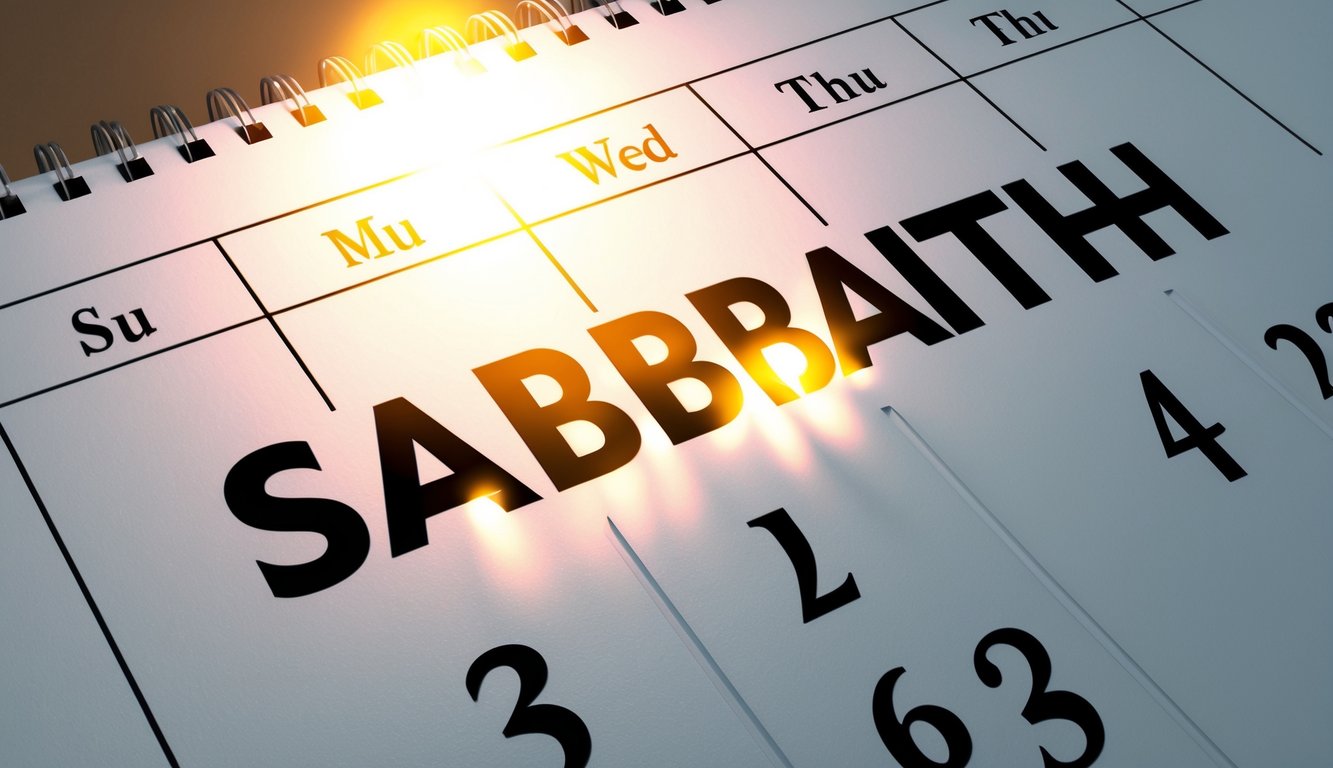Don’t Miss Out On This Unique Astrological Opportunity
Are you tired of spinning your wheels and getting nowhere? Simply put, you’re out of sync: you’re out of alignment with your astral configuration.
But: there’s a kind of map that can help you reclaim your alignment. Think of it as your own personal blueprint to success and happiness: a blueprint that will help you live your most amazing life.
Get started here.
Are you curious about which day the Sabbath falls on? In Judaism, the Sabbath is observed from Friday sunset to Saturday nightfall.
This marks a period of rest and worship.
This day of the week has been a topic of interest across various faiths and cultures.
While Judaism maintains Saturday as the Sabbath, many Christian denominations celebrate it on Sunday, commemorating Jesus Christ’s resurrection.
The Sabbath has deep roots in religious texts and traditions.
In the Bible, it is described as a day when even God rested after the six days of creation.
Throughout history, the Sabbath has been a cornerstone for spiritual renewal and family time, weaving itself into the way societies structure their weekly routines.
If you’re wondering how these practices differ around the world or have stayed the same over centuries, this article will guide you through its fascinating history and diverse customs.
From its origins to modern observance, explore how the Sabbath continues to be a significant part of many people’s lives today.
Key Takeaways
- The Sabbath is observed from Friday sunset to Saturday nightfall in Judaism.
- Christian traditions often celebrate the Sabbath on Sunday.
- The Sabbath’s significance and practices vary across cultures and history.
The Origins of Sabbath
You can trace the origins of the Sabbath through the Bible, which reveals its significance and transformation over time.
The Sabbath’s roots can be found in creation, its commands are clearly stated in the Ten Commandments, and the tradition continues to be a cornerstone in Jewish faith and practice.
Biblical Foundations and the Seven-Day Week
In the Bible, the Sabbath emerges as part of the seven-day week cycle.
The Book of Genesis describes how God created the world in six days and rested on the seventh.
This seventh day is then blessed and made holy, laying the groundwork for the Sabbath.
This pattern establishes the concept of setting aside a day for rest, central to Jewish law.
The idea of these seven days is unique to Judaism among ancient cultures, and it highlights the significance of the Sabbath as a period of rest and spiritual reflection.
Exodus and the Ten Commandments
The Ten Commandments in the Book of Exodus further define the Sabbath.
Here, God commands the Israelites to keep the seventh day holy as a day of rest.
It becomes part of the covenant between God and the Jewish people, stressing obedience and dedication to divine law.
This commandment underscores rest and devotion, turning the Sabbath into not just a day off but a fundamental part of Jewish religious life.
For the Israelites, it was essential in maintaining their identity and relationship with God.
Creation and the Day of Rest
The Sabbath’s origin is closely tied to the concept of rest after creation, as described in Genesis 2:1-3.
After God’s six days of creation, the seventh day is special.
God rests, setting a perpetual rhythm of work followed by rest.
This act of rest by God becomes a model for humankind.
As a practice, observing the Sabbath becomes a way for people to remember the creative acts of God and to reflect on the divine intention for rest and holiness.
Through this tradition, the Sabbath retains its importance as a spiritual pause amidst daily life, inviting you to find peace and renewal each week.
Sabbath Observance Practices

Sabbath observance varies widely across religious traditions and cultures.
The practices often focus on rest, worship, and the spiritual significance of the day.
Traditional Jewish Sabbath
In Judaism, the Sabbath, or Shabbat, begins at sunset on Friday and ends at sunset on Saturday.
This day is dedicated to rest and spiritual reflection as commanded in Jewish law.
Lighting candles is a key ritual, marking the start of Shabbat.
The Sabbath meal often includes special bread, like challah, and is shared among family and friends.
Visits to the synagogue are common for prayer and communal worship.
Work, including cooking and baking, is restricted.
Sabbath concludes with the Havdalah ceremony, which marks the transition back to the regular week.
Christian Sabbath Interpretations
In Christianity, Sabbath observance varies.
Some Christians, like Seventh-day Adventists, observe it on Saturday, similar to Jewish tradition. Sunday, often called the Lord’s Day, is more typical for Catholics and many Protestants, including Lutherans.
On this day, Christians focus on rest and worship, reflecting the resurrection of Jesus Christ.
Many Christians attend church services for community prayer and spiritual renewal.
Unlike Jewish practice, some Christians allow limited work if it honors God.
Christians may interpret Sabbath laws more flexibly, drawing from New Testament teachings that emphasize freedom in Christ.
Sabbath in Different Religions and Cultures
Different religions and cultures observe “Sabbath” practices with unique approaches and meanings.
In Islam, Friday holds special significance as a day of communal prayer called Jumu’ah.
Reform Jews may have a more relaxed approach to Sabbath observance, with flexibility around traditional restrictions.
For some indigenous cultures, rest days or periods may focus on tuning into nature and community life rather than strict religious rituals.
These diverse practices show how sacred time is valued across cultures and faiths, each bringing unique interpretations and customs to the concept of the Sabbath.
Sabbath Through History and Cultural Evolution
The Sabbath has a rich history, evolving from ancient practices to modern-day observances.
Historical events have played a crucial role in shaping how people view and celebrate the Sabbath today.
From Ancient Traditions to Modern Practices
The Sabbath traces its origins back to ancient times.
In Jewish tradition, it is observed on the seventh day of the week, mirroring the creation story where God rested on the seventh day.
This day of rest symbolizes a time to cease work and focus on spirituality and community.
Throughout the centuries, different cultures adapted their Sabbath practices.
While Jewish communities maintain traditional observances, other groups have developed their own customs.
For example, Christians typically observe Sunday as their day of rest, commemorating Jesus’ resurrection.
As society changed, some communities integrated modern elements into their Sabbath rituals, making them more flexible yet retaining the core idea of rest and reflection.
Despite these changes, the essence of setting aside a day for spiritual rejuvenation remains central across different traditions.
Significant Historical Events Influencing Sabbath
Certain historical events have significantly impacted Sabbath observance.
During the Roman Empire, laws enforced Sunday as a day of rest, influencing how Christians practiced.
This shift distinguished Christian practices from Jewish traditions, which continued to honor Saturday.
In more recent history, industrialization affected Sabbath observance by challenging traditional rest days due to the demands of factory work.
Efforts to secure shorter work weeks laid the groundwork for modern work-rest balances, impacting how Sabbath is viewed in contemporary society.
Moreover, legal reforms ensured religious freedom, allowing individuals across cultures to celebrate the Sabbath according to their beliefs.
These changes highlight the adaptability of Sabbath practices while preserving the importance of a designated rest day in diverse communities.
Frequently Asked Questions

The Sabbath is a topic that has different interpretations.
Many questions arise about its observance, the day it falls on, and its significance in Christianity.
Who changed the Sabbath day to Sunday?
The shift from Saturday to Sunday worship is often associated with early Christian leaders in the Roman period.
It’s said to honor Christ’s resurrection on a Sunday.
This change was also influenced by the desire to distinguish Christian practices from Jewish traditions, which observed the Sabbath on Saturday.
Over time, Sunday worship became a central aspect of Christian life, reinforced by church teachings and imperial support.
Some believers also observe specific dietary restrictions during religious observances, leading to questions like, can you eat meat on Good Friday, which is traditionally a day of fasting and abstinence in many Christian denominations.
What is the true Sabbath day, Saturday or Sunday?
Traditionally, the Sabbath day is Saturday, the seventh day of the week.
This is outlined in the Bible and observed by Jewish communities.
What day is considered the Sabbath in Christianity?
In Christianity, many observe Sunday as a day of rest and worship, often calling it the “Lord’s Day,” although some groups still keep Saturday.
What are the traditional rules observed on the Sabbath day?
Traditional Sabbath observance includes rest from work, attending worship services, and spending time in reflection or prayer.
The emphasis is on rest and spiritual renewal.
Why was the Sabbath changed from Saturday to Sunday?
The change is linked to the early church’s efforts to distinguish itself from Jewish traditions, emphasizing Jesus’ resurrection, which Christians believe happened on a Sunday.
Does the Bible specify which day to observe the Sabbath?
The Bible designates the seventh day, Saturday, as the Sabbath.
However, interpretations and traditions have varied over time, especially within different Christian denominations.



